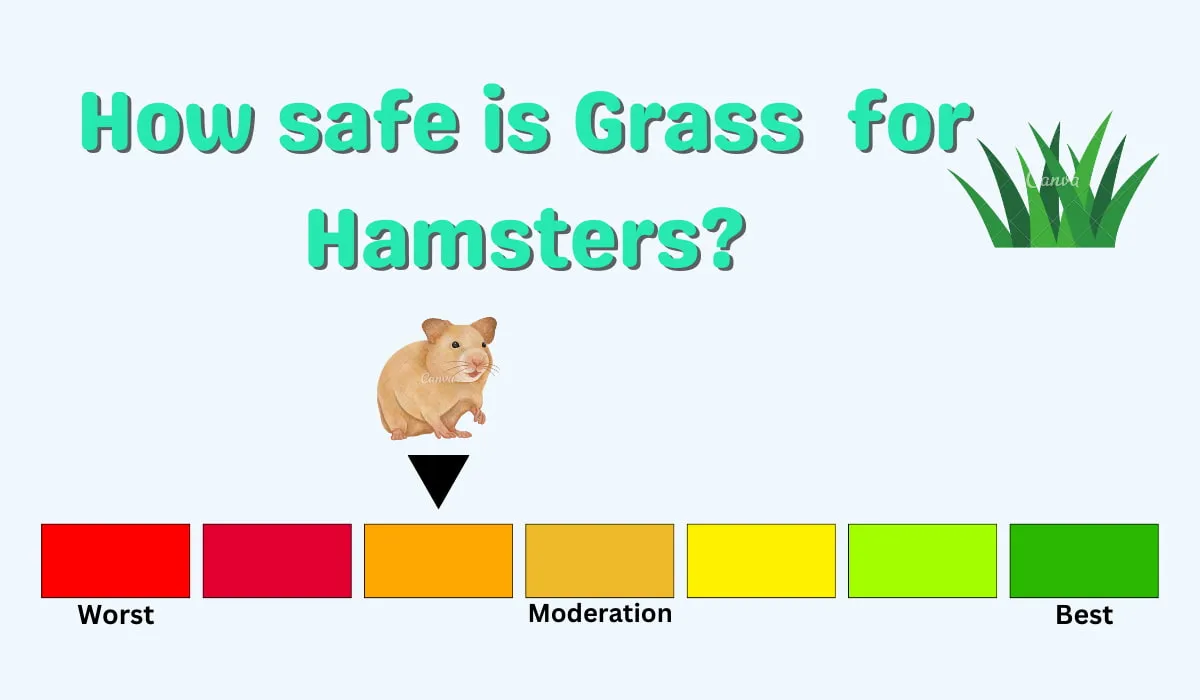So, you’ve found yourself pondering the question, “Can my hamster eat grass?”
A simple question, but the answer is a bit more complex.
Let’s delve into the fascinating world of hamster nutrition, shall we?

can hamsters eat grass?
Yes, hamsters can eat grass! But, it’s vital to ensure that the grass is organic, fresh, and clean.
Unlike their relatives, guinea pigs, and rabbits, hamsters have a distinctive digestive system that calls for a specialized diet.
Grass can offer several benefits, like hydration enhancement, an antioxidant boost, and a significant source of fiber for your furry friend.
But hold on! The same grass that offers these perks can also present some hazards.
Hidden in the blades could be pesticides, parasites, and toxins. Not to mention the potential for mold.
All these could lead to digestive problems, turning your hamster’s snack time into an ordeal.
How Much and How Often to Feed Grass to Hamsters
Hamsters are tiny creatures, and their diet should reflect their petite size.
Grass is a great addition, but it’s not a staple food.
A hamster’s meal of grass should be no more than 3 or 4 stems at a time, and this should only occur twice or thrice a week.
Overdoing it can lead to tummy troubles, so keep it minimal!
How to Feed Grass to Hamsters Safely and Effectively
Feeding your hamster grass is not as simple as plucking a few blades and handing them over.
Here are some tips to ensure you’re doing it right:
- Choose Your Grass Wisely: Choose fresh, organic, and pesticide-free grass. Avoid grass from roadsides, parks, or gardens that could be contaminated.
- Cleanliness is key: Make sure to wash and dry the grass thoroughly before offering it to your hamster. This helps to remove any lurking dirt, dust, or bugs.
- Size Matters: Cut the grass into small pieces to prevent choking or tangling. Hamsters have cheek pouches that can store food, but long or sharp grass blades can cause trouble.
- Monitor Reactions: Keep an eye on your hamster’s reaction to the grass. Some hamsters may adore it, while others may ignore or even dislike it. Some hamsters may also show allergic reactions or sensitivities to grass, with symptoms like sneezing, itching, or swelling.
Is it safe for my hamster to roam and graze on the grass from the lawn?
The short answer? No, it’s not.
Here’s why: lawns can be hazardous territory for your furry pal.
They can be infested with harmful chemicals such as pesticides, fertilizers, and herbicides, all of which can pose a severe threat to your hamster’s health.
In addition, lawns can harbor parasites, bacteria, and viruses that can lead to health complications like diarrhea, respiratory infections, or skin problems.
So, even though the image of your hamster scampering in the grass might be charming, it’s safer to keep them away from the lawn.
Can Hamsters Eat Wheat Grass and Cat Grass?
While lawn grass is a no-go, wheat grass and cat grass can be a safe alternative.
Grown indoors for pets, these grass types are generally acceptable for your hamster.
However, they should be served sparingly. Hamsters have a small digestive system, and overfeeding can result in an upset stomach.
Can Baby Hamsters Eat Grass?
Hamster pups, as adorable as they are, have a delicate digestive system.
Feeding them grass can lead to digestive issues. Hence, it’s best to keep them away from any form of greens until they’re at least 6 weeks old.
Instead, a healthy diet of fresh vegetables, seeds, and nuts will keep them thriving.
Healthy Alternatives to Grass for Hamsters
While grass may seem like a natural choice for hamsters, they don’t necessarily need it.
A variety of other foods can provide more nutrition and variety for your furry friend. Foods like:
Conclusion
While grass can be a part of a hamster’s diet, it’s crucial to ensure it’s safe. Offering clean, untreated grass in moderation can add some variety to their diet.
Always observe your hamster’s reaction and adjust the diet accordingly. With the right choices, you’re on the path to seeing your pet thrive!
